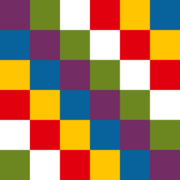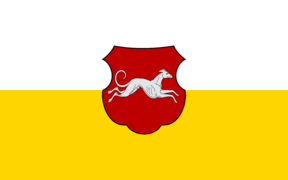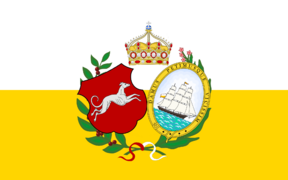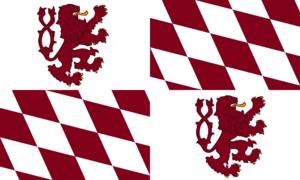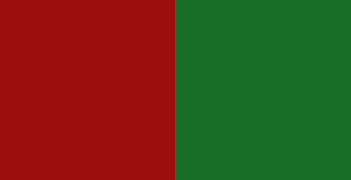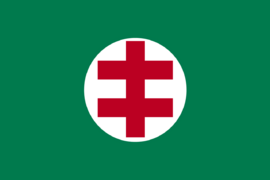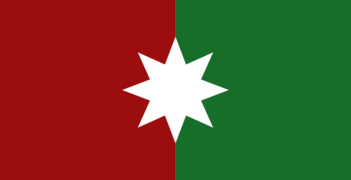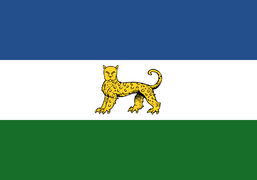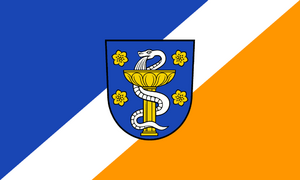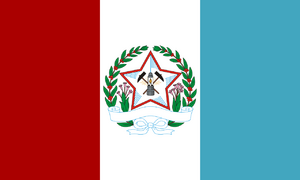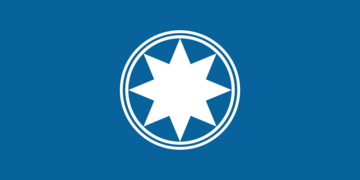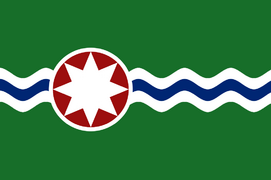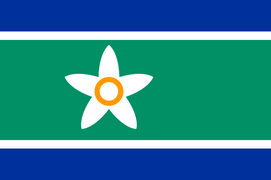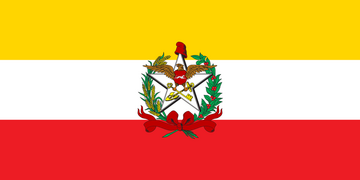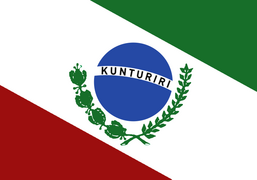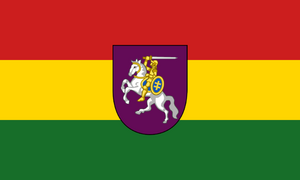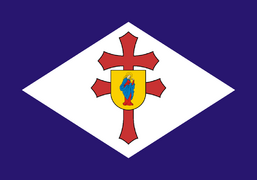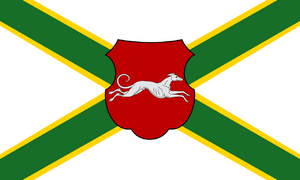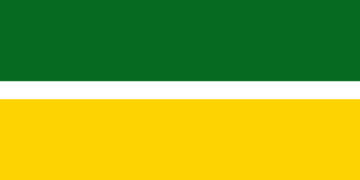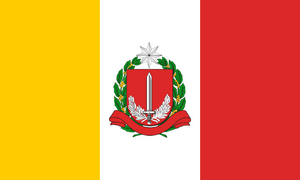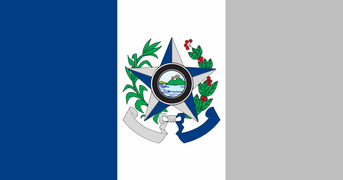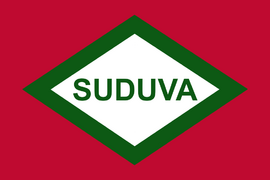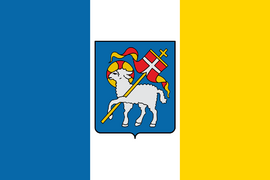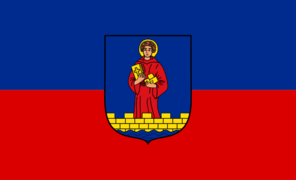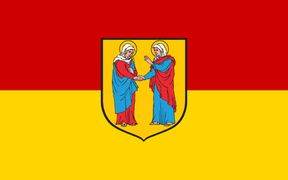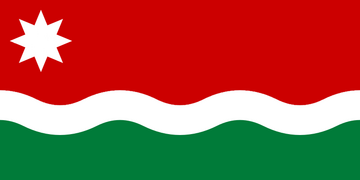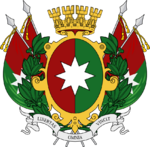Flag of Aucuria: Difference between revisions
mNo edit summary |
|||
| (7 intermediate revisions by the same user not shown) | |||
| Line 19: | Line 19: | ||
The '''flag of [[Aucuria]]''' ({{wp|Lithuanian language|Ruttish}}: ''Aukurijos vėliava'') is a vertical {{wp|Bicolour (flag)|bicolor}} of red and green with a white {{wp|Octagram|eight-pointed star}} centered in the middle of the flag. Originally adopted in 1786 during the [[Aucurian Revolution|Aucurian War of Independence]], it has been used in Aucuria in some form by every iteration of the Aucurian state since; the [[First Aucurian State|First]] and [[Second Aucurian State|Second Aucurian States]], regarded by the Aucurian Republic as illegitimate, used a version of the banner without the central star. Aucuria's current law of national symbols was adopted in 1980 following the [[Velvet Revolution]], and governs the use of the country's flag. | The '''flag of [[Aucuria]]''' ({{wp|Lithuanian language|Ruttish}}: ''Aukurijos vėliava'') is a vertical {{wp|Bicolour (flag)|bicolor}} of red and green with a white {{wp|Octagram|eight-pointed star}} centered in the middle of the flag. Originally adopted in 1786 during the [[Aucurian Revolution|Aucurian War of Independence]], it has been used in Aucuria in some form by every iteration of the Aucurian state since; the [[First Aucurian State|First]] and [[Second Aucurian State|Second Aucurian States]], regarded by the Aucurian Republic as illegitimate, used a version of the banner without the central star. Aucuria's current law of national symbols was adopted in 1980 following the [[Velvet Revolution]], and governs the use of the country's flag. | ||
Aucuria celebrates its [[Flag Day (Aucuria)|Flag Day]] on March 22, the anniversary of the flag's original adoption by the [[Revolutionary Saeimas]]. | |||
==Design and symbolism== | ==Design and symbolism== | ||
| Line 64: | Line 64: | ||
[[Vilimas Kuzleika]], who designed the original version of the flag, explained the symbolism of the flag as follows: | [[Vilimas Kuzleika]], who designed the original version of the flag, explained the symbolism of the flag as follows: | ||
{{quote|The color green is to represent our country and the agricultural and mineral wealth with which it has been so greatly blessed; the color red represents the valor and vigor of the Aucurian people, and the blood of Aucurian patriots shed in defense of their land and rights. Emblazoned in the middle is a white, eight-pointed star, its color symbolizing the triumph of hope over tyranny and its eight points representing the sacred values to which the members of [[Revolutionary Saeimas|this Saeimas]] swore obeisance - the liberty of all men | {{quote|The color green is to represent our country and the agricultural and mineral wealth with which it has been so greatly blessed; the color red represents the valor and vigor of the Aucurian people, and the blood of Aucurian patriots shed in defense of their land and rights. Emblazoned in the middle is a white, eight-pointed star, its color symbolizing the triumph of hope over tyranny and its eight points representing the sacred values to which the members of [[Revolutionary Saeimas|this Saeimas]] swore obeisance - the natural liberty of all men; equality before the law; the independence of the Aucurian nation; swift and impartial justice; honor even in the face of the dishonorable; purity of word and deed; fraternity with all other freedom-loving peoples; and fidelity to our cause, until victory or death.}} | ||
Kuzleika's interpretation has persisted largely unchanged into the present, and remains both the most prevalent interpretation among the Aucurian public and the official interpretation endorsed by the Aucurian government. | Kuzleika's interpretation has persisted largely unchanged into the present, and remains both the most prevalent interpretation among the Aucurian public and the official interpretation endorsed by the Aucurian government. | ||
Nonetheless, sometimes additional elements of symbolism have been added. While never explicitly stated as such by Kuzleika, the eight-pointed star on the flag has regularly been said to represent a {{wp|compass rose}} or the {{wp|Polaris|Pole Star}} due to its shape; Aucuria's origins in the crossing of the oceans by Ruttish explorers and settlers; and the points of the star symbolizing the "{{wp|Cynosure|cynosures}}", or guiding principles, of the Aucurian Republic. | |||
==Protocol and use== | ==Protocol and use== | ||
| Line 72: | Line 74: | ||
==History== | ==History== | ||
===Precolonial period=== | |||
[cutinsuan and other indigenous banners] | |||
===Colonial period=== | |||
[ruttish, rudolphine flags] | |||
===Republican period=== | |||
[creation of modern flag and any variants thereof] | |||
===Gallery=== | ===Gallery=== | ||
| Line 79: | Line 93: | ||
Cutinsua banner stripes.png|{{FIAV|historical}}{{FIAV|reconstructed}}Attested banner of [[Cutinsua]] <small>(1344–1543)</small> and the [[Great Cutinsuan Revolt]] <small>(1608–1612)</small> | Cutinsua banner stripes.png|{{FIAV|historical}}{{FIAV|reconstructed}}Attested banner of [[Cutinsua]] <small>(1344–1543)</small> and the [[Great Cutinsuan Revolt]] <small>(1608–1612)</small> | ||
Flag of Ruttland.png|{{FIAV|historical}}Flag of [[Ruttish Aucuria]] <small>(1538–1693)</small> | Flag of Ruttland.png|{{FIAV|historical}}Flag of [[Ruttish Aucuria]] <small>(1538–1693)</small> | ||
Flag of Ruttland.png|{{FIAV|historical}}Flag of the [[United Kingdom of Ruttland and Aucuria]] <small>(1693–1721)</small> | Flag of Ruttland-Aucuria.png|{{FIAV|historical}}Flag of the [[United Kingdom of Ruttland and Aucuria]] <small>(1693–1721)</small> | ||
File:Ahnemunde Confederation flag.png|{{FIAV|historical}}Flag of [[Rudolphine Aucuria]] <small>(1721–1792)</small> | File:Ahnemunde Confederation flag.png|{{FIAV|historical}}Flag of [[Rudolphine Aucuria]] <small>(1721–1792)</small> | ||
File:AucuriaCollabFlag.png|{{FIAV|historical}}Flag of the [[First Aucurian State|First]] <small>(1885–1891)</small> and [[Second Aucurian State|Second]] <small>(1928–1934)</small> Aucurian States | File:AucuriaCollabFlag.png|{{FIAV|historical}}Flag of the [[First Aucurian State|First]] <small>(1885–1891)</small> and [[Second Aucurian State|Second]] <small>(1928–1934)</small> Aucurian States | ||
Aucuria Lorraine cross.png|{{FIAV|historical}}War flag sometimes used by the [[National Redoubt Government]] <small>(1928–1934)</small> | |||
RepAucuriaFlag.png|{{FIAV|normal}}Current flag of [[Aucuria]] <small>(1786–present)</small> | RepAucuriaFlag.png|{{FIAV|normal}}Current flag of [[Aucuria]] <small>(1786–present)</small> | ||
</gallery> | </gallery> | ||
== | ==State flags== | ||
The flags of the [[States of Aucuria|states of Aucuria]] demonstrate a variety of trends, references, histories, and design principles, invoking a mixture of local and national symbology. Most Aucurian states first officially adopted flags in the mid-to-late 19th century, as a means of expressing local identity; some states had unofficial flags as early as the 1830s. The most recently adopted state flag is that of [[Kajapas]], which adopted its current flag on [date]. | |||
===Current flags=== | |||
<gallery mode=nolines mode=packed> | |||
Flag of Bendrieji Laukai.png|[[Bendrieji Laukai|Flag of Bendrieji Laukai]] | |||
Flag of Cataris.png|[[Cataris|Flag of Cataris]] | |||
Flag of Chanchamaya.png|[[Chanchamaya|Flag of Chanchamaya]] | |||
Flag of Chucisaca.png|[[Chucisaca|Flag of Chucisaca]] | |||
Flag of Juoda.png|[[Juoda|Flag of Juoda]] | |||
Flag of Kajapas.png|[[Kajapas|Flag of Kajapas]] | |||
Flag of Kestutia.png|[[Kestutia|Flag of Kestutia]] | |||
Flag of Kunturiri.png|[[Kunturiri|Flag of Kunturiri]] | |||
Flag of Leikauskas.png|[[Leikauskas (state)|Flag of Leikauskas]] | |||
Flag of Magdaliete.png|[[Magdaliete|Flag of Magdaliete]] | |||
Flag of New Ruttland.png|[[New Ruttland|Flag of New Ruttland]] | |||
Flag of Oroncota.png|[[Oroncota|Flag of Oroncota]] | |||
Flag of Pakrashchia.png|[[Pakrashchia|Flag of Pakrashchia]] | |||
Flag of Sidabria.png|[[Sidabria|Flag of Sidabria]] | |||
Flag of Suduva.png|[[Suduva|Flag of Suduva]] | |||
Flag of Sventasis Silvestris.png|[[Šventasis Silvestras|Flag of Šventasis Silvestras]] | |||
Flag of Sventasis Steponas.png|[[Šventasis Steponas|Flag of Šventasis Steponas]] | |||
Flag of Sventoji Elzbieta.png|[[Šventoji Elžbieta|Flag of Šventoji Elžbieta]] | |||
Flag of Tucatia.png|[[Tucatia|Flag of Tucatia]] | |||
</gallery> | |||
===Historical state and territory flags=== | |||
[[Category:Aucuria]] | [[Category:Aucuria]][[Category:National flags]] | ||
{{Template:Aucuria topics}} | {{Template:Aucuria topics}} | ||
Latest revision as of 21:42, 1 April 2023
This article is incomplete because it is pending further input from participants, or it is a work-in-progress by one author. Please comment on this article's talk page to share your input, comments and questions. Note: To contribute to this article, you may need to seek help from the author(s) of this page. |
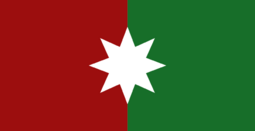 | |
| Name | Dvispalvė (Bicolor) Raudona-žalia (Red-and-green) Baltažvaigždėtas (White-Starred) Vieniša žvaigždė (the Lone Star) |
|---|---|
| Use | National flag and ensign |
| Proportion | 5.13:10 |
| Adopted | 22 March 1786 |
| Design | A vertical bicolor of red and green with a white eight-pointed star centered along the dividing line. |
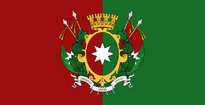 Variant flag of Aucuria | |
| Use | State flag |
| Proportion | 5.13:10 |
| Design | A vertical bicolor of red and green with the Aucurian coat of arms centered along the dividing line. |
The flag of Aucuria (Ruttish: Aukurijos vėliava) is a vertical bicolor of red and green with a white eight-pointed star centered in the middle of the flag. Originally adopted in 1786 during the Aucurian War of Independence, it has been used in Aucuria in some form by every iteration of the Aucurian state since; the First and Second Aucurian States, regarded by the Aucurian Republic as illegitimate, used a version of the banner without the central star. Aucuria's current law of national symbols was adopted in 1980 following the Velvet Revolution, and governs the use of the country's flag.
Aucuria celebrates its Flag Day on March 22, the anniversary of the flag's original adoption by the Revolutionary Saeimas.
Design and symbolism
The Constitution of Aucuria establishes the country's flag as "a red-and-green bicolor emblazoned in the middle with a white, eight-pointed star". Further specifications regarding the colors, dimensions, and construction of the flag are contained in the country's 1980 Law on the Flag of the Republic. An "official copy" of the flag made according to the specifications within this legislation is kept in the country's national archives.
| Scheme | Red | White | Green |
|---|---|---|---|
| RGB | 156-14-14 | 255-255-255 | 23-110-41 |
| CMYK | 0-91-91-39 | 0-0-0-0 | 79-0-63-57 |
| Hex | #9C0E0E | #FFFFFF | #176E29 |
| Pantone (approximation) |
2350c | White | 349c |
| RAL (approximation) |
3002 | 9016 | 6001 |
| Web-safe | #990000 | #FFFFFF | #006633 |
Vilimas Kuzleika, who designed the original version of the flag, explained the symbolism of the flag as follows:
The color green is to represent our country and the agricultural and mineral wealth with which it has been so greatly blessed; the color red represents the valor and vigor of the Aucurian people, and the blood of Aucurian patriots shed in defense of their land and rights. Emblazoned in the middle is a white, eight-pointed star, its color symbolizing the triumph of hope over tyranny and its eight points representing the sacred values to which the members of this Saeimas swore obeisance - the natural liberty of all men; equality before the law; the independence of the Aucurian nation; swift and impartial justice; honor even in the face of the dishonorable; purity of word and deed; fraternity with all other freedom-loving peoples; and fidelity to our cause, until victory or death.
Kuzleika's interpretation has persisted largely unchanged into the present, and remains both the most prevalent interpretation among the Aucurian public and the official interpretation endorsed by the Aucurian government.
Nonetheless, sometimes additional elements of symbolism have been added. While never explicitly stated as such by Kuzleika, the eight-pointed star on the flag has regularly been said to represent a compass rose or the Pole Star due to its shape; Aucuria's origins in the crossing of the oceans by Ruttish explorers and settlers; and the points of the star symbolizing the "cynosures", or guiding principles, of the Aucurian Republic.
Protocol and use
Variants
History
Precolonial period
[cutinsuan and other indigenous banners]
Colonial period
[ruttish, rudolphine flags]
Republican period
[creation of modern flag and any variants thereof]
Gallery
Attested banner of Cutinsua (1344–1543)
Attested banner of Cutinsua (1344–1543) and the Great Cutinsuan Revolt (1608–1612)
Flag of Ruttish Aucuria (1538–1693)
Flag of the United Kingdom of Ruttland and Aucuria (1693–1721)
Flag of Rudolphine Aucuria (1721–1792)
War flag sometimes used by the National Redoubt Government (1928–1934)
Current flag of Aucuria (1786–present)
State flags
The flags of the states of Aucuria demonstrate a variety of trends, references, histories, and design principles, invoking a mixture of local and national symbology. Most Aucurian states first officially adopted flags in the mid-to-late 19th century, as a means of expressing local identity; some states had unofficial flags as early as the 1830s. The most recently adopted state flag is that of Kajapas, which adopted its current flag on [date].
